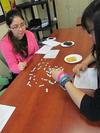Blood Tests Are Important
by Marizze Chan
(Philippines)

Blood tests are regularly recommended by doctors and other healthcare professional. It is usually to pinpoint the underlying cause of an illness.
Some evidences found in blood works are particularly useful in making clinically tough diagnoses.
Blood tests provide helpful information in adults and children of all age groups; newborns to teenagers.
Blood tests are also done to ensure the desired effect of ongoing therapy and that the relevant blood parameters are as they optimally ought to be.
Basic Metabolic Panels: One Needle Stick, Several Results
Physicians commonly order a series of tests collectively known as a basic metabolic panel either to gain insight about troubling symptoms or as part of routine health checkups.
One of the advantages of a basic metabolic panel is that technicians use the same blood sample to look at many factors, so it’s quick and only requires one stick with a needle.
The results of basic metabolic panel show levels of substances like electrolytes, calcium, glucose, metabolites and waste products that should be filtered out quickly when the body is functioning properly.
Abnormal findings may indicate a condition like high blood sugar, dehydration, metabolic syndrome or a malfunctioning kidney among many other possibilities.
However, a single abnormal result isn't necessarily a sure sign of a problem, but perhaps a reason for a healthcare professional to order more tests.
Complete Blood Counts: An Evaluation of the Body’s Three Cell Types
If a child has been struggling with unexplained fatigue or excessive bruising, a complete blood count could help target possible causes. The human body has white blood cells, red blood cells and platelets. A complete blood count looks at the quantity of these types of cells.
Red blood cells carry oxygen throughout the body, and if a red blood cell count is too low, that could indicate anemia.
White blood cells are responsible for
fighting infection. Too high or too low white blood cell count in child's blood test usually signifies inflammation due to one or other cause.
Finally, the platelets:
They help blocking the blood flow after a cut by initiating clotting mechanism. In event of inappropriate platelet count, a child could be at risk for potentially fatal bleed.
Blood Test Could Even Diagnose Depression
Last year, ABC News reported that scientists have discovered a way to use a blood test in diagnosing teenage depression.
Earlier, healthcare providers had to solely relied on patients’ own report of symptoms, which was often marked with uncertainties as most people are wary to talk about their true feeling; more so children and teenagers.
A journal called Translational Psychiatry profiled how researchers looked for the presence of certain blood markers to diagnose whether or not subjects were suffering from depression.
Previously these blood markers were not linked to depression. The research team has identified them to be connected with depressive mental state, first in rats, and then humans.
Ask the Doctor: It's Free!!!!
To Sum Up
Given above are not the only blood tests used; they are a few of the most common ones that are recommended by health care professionals.
If you’re facing one of these tests or something similar, be assured that the information derived gives your Doc the power to act, and unfavorable results don’t necessarily confirm issues with certainty.
Liked what you read just now? Pay it forward!












